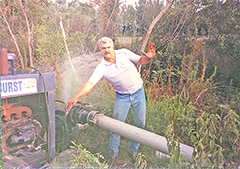John Willoughby
reporter2@greenepublishing.com
Since 2004, Joe Reams Jr., affectionately known as Joe Ball to those in Greenville, has been retired from the hard work that is tobacco farming. But it was an important thing for the 74-year-old southern man to carry on the legacy that was started generations prior to him, by his great-great-grandfather, Calvin Joshua.
The lineage of Reams farmers once contributed to North Florida's status as one of the largest areas for growing tobacco. The operation was handed down to Albert Reams, Calvin Joshua's son; and then to A.D. Reams, who later passed down the family farm to his son, Joe Reams Sr., Reams' father. As a young man, Joe Ball was forced to step up as the oldest man of the household once his father passed away in 1965. Prior to his somewhat unwanted promotion at the time, Joe Ball was pursuing a degree at Abraham Baldwin Agricultural College, in Tifton, Ga., to build a career in veterinarian services. But when news came about his father, things changed.
Returning home after concluding the semester at hand, Joe Ball, with the help of his uncle, took over the family farm, which included 20 acres of tobacco and 125 acres of corn, and other land that held soy bean crops, cattle and timberland, which was something to fall back on when times got hard with their main source of income. Reams recalls when his tobacco, a Hicks Broadleaf brand, was struck by a disease just years after he began farming. It later called for a new variety of tobacco to be grown on his land. "We weathered the storm through the years," Reams added.
The corn crops fell off after President Jimmy Carter became President and enacted the United States grain embargo against Soviet Russia in 1980. Reams soon became adjusted to running the farm and the tobacco operation eventually expanded to nearly 250 acres in Madison, Jefferson and Taylor counties.
The operation saw 10 weeks of harvesting, when the time came. The harvest called for many croppers, stringers, handers and others to work in the fields and barns to ensure the on-time send-off of tobacco in the form of a bail of cured tobacco, no larger than 300 lb, to a nearby warehouse in Madison. The bails would then wait for buyers who would visit once per year, according to Reams. "Tobacco was hand labor," said Reams, who stated that combines were often used at times. "It took a lot of people."
In Florida, tobacco was an important part of the Sunshine State's agriculture business, especially in Madison County. Cured by wood fire or gas burners, sun tobacco was and is used for cigars, pipes and chewing tobacco. Reams retired from the business in 2004, but still believes that farmers nationwide are the backbone of what we have today. "If you want to eat, somebodies got to farm," Reams stated. "Anything you use, basically comes from a farmer."
While Reams' son, Joe Reams III, like his father, no longer grows tobacco, he continues the family legacy of working in the farming industry. Reams III currently owns and operates Southern Habitats, and his father made sure that knowing how to work a farm was a part of his up-bringing. "He just had to work with me," Reams said. "When he was big enough, he had to go with me."
Joe Ball remains in Greenville and is married to Kimberly Reams. He is the father of Georgia Reams Cantey, Joe Reams III, Becky Reams Swain, Savannah Reams and Christiana Reams.

